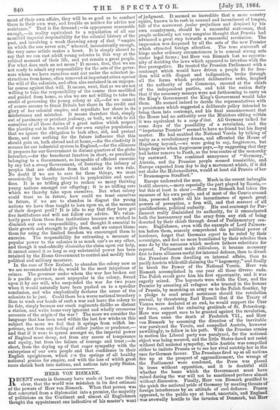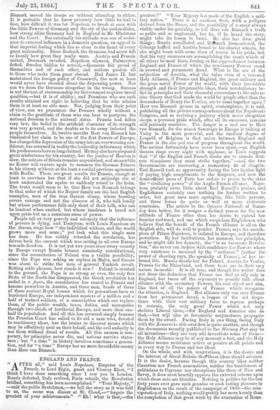flees. It is no trifling glory to reckon so many
thriving Europe underrated the man. Much in the recent imbroglio young nations amongst our offspring ; it is no trifling care is still obscure,—more especially the part played by Russia,— which we thereby take upon ourselves. But what colony but this at least is clear :—Herr von Bismark had taken the- could trust us in future, how could we trust ourselves measure of his own people, and of most of the Courts around in future, if we are to abandon in disgust the young him, possessed under all his incontinence of speech great. nations we have thus taught to lean upon us, at the moment powers of perception, a firm will, and that scarcest of all of their deepest peril ? It is idle to say that they have got qualifications, political audacity. His cool contempt for Par-' free institutions and will not follow our advice. We volun- liament really diminished its authority, for it emancipated tarily gave them these free institutions because we wished to both the bureaucracy and the army from any risk of being diminish our own responsibility, and thought it essential to deserted by their chiefs through dread of Parliamentary cen- their growth and strength to give them, and we cannot blame sure. Englishmen, even with the example of Lord Palmers- them for using the limited freedom we encouraged them to ton before them, scarcely comprehend the political power of exercise. The responsibility for entrusting a measure of insolence, forget that Germans expect to be ruled by their popular power to the colonies is as much our's as any other, sovereigns, and feel no more humiliated by their rebukes than and though it undoubtedly diminishes the claim upon our help, sons do by the sarcasms which modern fathers substitute for it cannot cancel it so long as any substantial power has been reproof. Parliament made ridiculous, it became necessary- retained by the Home Government to control and modify their first to form alliances useful for internal defence, then to divert in irons without opposition, and it is doubtful still HERR VON BISMARK. whether the loans which the Government must have Bismark moved his troops on without attending to either. It is probable that he knew privately how little he had to fear, how difficult it was for Napoleon to break at once with the little Powers of Germany and the cry of the nationalities, how strong allies Germany had in England in Mr. Gladstone and the Court. But externally his attitude was one of resist- ance to external influence in a domestic question, an appeal to that imperial feeling which lies so close to the heart of every great nationality. Since Rosbach the Germans had never felt so keenly how great they really were. Austria and Prussia united, Denmark invaded, Napoleon silenced, Palmerston defied, Sweden bidden to retreat,—Germans felt proud of themselves and of each other, and nations pardon all to those who make them great abroad. Had James II. but maintained the foreign policy of Cromwell, the mob at least would never have shouted about the dispensing power. Nor can we deem the Germans altogether in the wrong. Success is not the test of statesmanship for Government requires moral qualities,—but it is of ability ; and Prussians who see such results attained are right • in believing that he who attains them is at least an able man. Nor, judging from their point of view, can we pronounce the Premier wholly without a claim to the gratitude of those who can bear to postpone the national freedom to the national status. Prussia had fallen very low, the belief in the artificial character of its strength was very general, and the doubts as to its army infected the people themselves. In twelve months Herr von Bismark has vindicated her claim to be one of the first Powers of Europe, has changed the depression of the army into an overweening con- fidence, has assumed in realitythe leadership in Germany which his predecessors have so long claimed. He may also have prepared great misfortunes for his country, but the justice of Heaven is slow, the seizure of Silesia remains unpunished, and meanwhile no Kaiser will venture again to summon the German Princes to his stirrup without at the least a cordial previous agreement with Berlin. These are great results for Prussia, enough at least to convince her that if she did not misjudge she at least underrated the squire so suddenly raised to the helm. The truth would seem to be that Herr von Bismark belongs to that order of which the Napier family are the best English examples, men of the true Gascon stamp, whose boasting covers courage and not the absence of it, who talk loudly but whose performance falls only short of their talk, who can be insolent when excited, but whose insolence is based not upon pride but on a conscious sense of power.
People tell us very gravely and solemnly that the influence of persons is dying, and Tennyson, with Louis Napoleon on the throne, sings how " the individual withers, and the world grows more and more ;" yet look what this single man has done. He has visibly retarded the revolution, has driven back the current which was setting in all over Europe towards freedom. It is not yet two years since every country in Europe except Russia became nominally constitutional, since the resuscitation of Poland was a visible possibility, since the Pope was asking an asylum in Malta, and Greece was about to strike the note of general Turkish revolt. Setting aside phrases, how stands it now ? Poland is crushed to the ground, the Pope is as strong as ever, the only free State of the North has disappeared, the Greek revolution has ended in a fiasco, the constitution has ceased in Prussia and become powerless in Austria, and three men, heads of three of those ancient Royal houses which for generations have so burdened Europe, are independent masters of a million and a half of trained soldiers, of a conscription which can replace them, of the public wealth, taxes, duties, and monopolies through two-thirds of territorial Europe, and more than one- half its population. And all this has occurred simply because the Prussian Court has called to its aid a man who, devoted to reactionary ideas, has the brains to discover means which may be effectively used on their behalf, and the evil audacity to use them without dread of results. All this success is tem- porary, for principles never die, and nations survive states- men ; but " a time" in history involves sometimes a genera- tion, and for " a time " Europe has no more formidable enemy than Herr von Bismark.































 Previous page
Previous page